Not sure why, but my blog platform stopped allowing me to post pictures, and I didn’t quite get this post finished. I apologize for the text-heavy reading, here, but it is important, and I worked a while writing these reflections of the EfP conference and describing just some of the books we recommended there. If you want to see the book covers, you can find them at the publisher’s websites, or google images, but do come back and order them from us. Thanks! Click on the links below to order, at our special BookNotes 20% off discount. We show the regular prices in the review, but will deduct the discount for you when you order.
Perhaps the word I’m looking for is ironic. Or poignant. Timely, certainly works; relevant, spot-on. Providential? Yes, providential.
If you look carefully you can see our books against the back wall under the lights. 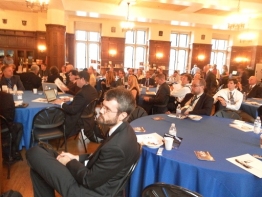 Even while the world’s leading news story was the unfolding drama of the savage attacks on US Embassies throughout the Arab world, inspired by stupid anti-Islamic propaganda, a group of us gathered in a small hall at Georgetown University to discuss and debate and learn about the Biblical call to peacemaking. A major theme of the Evangelicals for Peace conference was Christian-Muslim relations and speakers included former missionaries to Muslims and relief and development activists who, in fact, have friends throughout the Arab world. Even as we were listening to presentations, asking questions, confabbing away, one speaker was on his cell phone, talking to contacts at Al Jarzeera, begging them to restrain their descriptions of the offensive movie. He at least got them to stop calling it an “American” film, which he had reason to believe might stop some of the rioting, maybe even save some lives. Our speakers, our questions, our prayers, and our conversations were weighted with a sense of urgency.
Even while the world’s leading news story was the unfolding drama of the savage attacks on US Embassies throughout the Arab world, inspired by stupid anti-Islamic propaganda, a group of us gathered in a small hall at Georgetown University to discuss and debate and learn about the Biblical call to peacemaking. A major theme of the Evangelicals for Peace conference was Christian-Muslim relations and speakers included former missionaries to Muslims and relief and development activists who, in fact, have friends throughout the Arab world. Even as we were listening to presentations, asking questions, confabbing away, one speaker was on his cell phone, talking to contacts at Al Jarzeera, begging them to restrain their descriptions of the offensive movie. He at least got them to stop calling it an “American” film, which he had reason to believe might stop some of the rioting, maybe even save some lives. Our speakers, our questions, our prayers, and our conversations were weighted with a sense of urgency.
And gladness. For many of us it is rare to hear such a clear witness to the peaceful ways of Christ’s Kingdom, rare to hear evangelicals, especially, with such morally serious and politically sophisticated insights.
And what a joy for me to get to talk about Yoder and Kuyper (yes, he came up!) and Hauerwas, etcetera. And to show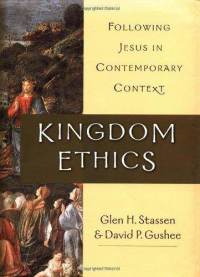 off titles like Ron Sider’s new book Just Politics: A Guide for Christian Engagement (Baker; $19.99) and to commend Lisa Sharon Harper’s pro-Democratic back and forth conversation with a political conservative, Left, Right & Christ: Evangelical Faith in Politics, co-authored by Kings College political science prof D.C. Innes (Russell Media; $22.99.) We think the world of the excellent study Kingdom Ethics: Following Jesus in Contemporary Context by Glen Stassen and David Gushee (IVP; $35.00) and enjoyed stacking ’em up with both authors there. I only wish we had sold more. It’s a great book.
off titles like Ron Sider’s new book Just Politics: A Guide for Christian Engagement (Baker; $19.99) and to commend Lisa Sharon Harper’s pro-Democratic back and forth conversation with a political conservative, Left, Right & Christ: Evangelical Faith in Politics, co-authored by Kings College political science prof D.C. Innes (Russell Media; $22.99.) We think the world of the excellent study Kingdom Ethics: Following Jesus in Contemporary Context by Glen Stassen and David Gushee (IVP; $35.00) and enjoyed stacking ’em up with both authors there. I only wish we had sold more. It’s a great book.
After a few muffled “amens” were heard during one of the impressive keynotes, I whispered to Dave Gushee, “Can’t an academic conference also be a bit of a gospel revival?” How great that an event designed to help us struggle with questions of global conflict resolution, even when religious differences are at the heart of those conflicts, is also quite intentional about naming the Name of Jesus, the Prince of Peace. Glory, Hallelujah, indeed!
Several perspectives and voices and vantage points were prevalent at the Evangelicals for Peace conference. That it was mostly organized by Rick Love, founder of Peace Catalyst International was evident: there were different sorts of leaders—scholars and activists and missionaries, and a delightful mix of views, Reformed, Anabaptist, charismatic, mainline, and others.
We were taught by scholarly but passionate ethicists like Stassen (Fuller Theological Seminary), Gushee (Mercer University) and Eric Patterson (Georgetown University, Regent University.) They presented heavy-duty lectures, clear and interesting, theologically foundational with huge implications for policy.
Lisa Sharon Harper, an old IVCF friend, now active in mobilizing folks for Sojourner’s, kept it real as she talked about the Biblical call to peacemaking and preached a bit about her own evangelically-guided sense of shalom. Although she tilts to the left, I like the title of her book, Evangelical Does Not Equal Republican or Democrat (The New Press; $24.95.) It carries a nice forward by John Perkins.
There were think-tank scholars who serve as citizen diplomats, working in partnership, even, with the State Department and the Pentagon. Douglas Johnston (President of the International Center for Religion & Diplomacy) has taught courses for our own diplomatic corps on how to be more aware of global religions and has shown in book after book how a lack of religious awareness has caused us to miss cues, creating havoc all over the world. Recently he has been teaching even in the infamously militant madrasahs of Pakistan; I don’t know if I have ever heard anyone speak that had first-hand friendships with Jihadists and it was extraordinary, and heartening! Of course not all madrasahs are ultra-conservative or related to Islamic fundamentalism, let alone breeding ground for terrorists. Yet some are, and it is remarkable that Johnston, who is so esteemed as a scholar, is helping strategic people understand respectful ways to approach faith, even in diplomatic work. His most famous books are Religion: The Missing Dimension in Statecraft (Oxford University Press; $50.00) and the edited collection Faith-Based Diplomacy Trumping Realpolitik (Oxford University Press; $22.95.) His latest book, which he himself nicely explained, is called Religion, Terror, and Error: U.S. Foreign Policy and the Challenge of Spiritual Engagement (Praeger; $49.99) which is a handbook on these things for anyone who works in international affairs.
Similarly, Joseph Cumming, the Director of the Yale Center for Faith and Culture Reconciliation Program, has extraordinary contacts in the Muslim world, doing profound work building bridges of collaboration with Muslims, Christians Jews—perhaps you know the important book The Common Word: Muslims and Christians on Loving God and Neighbor edited by Miroslov Volf and Prince Ghazi bin Muhammad Bin Talai (Eerdmans; $14.00.) That came out of the Yale Center and has proven to be very fruitful. Cumming has a chapter in it. What a delight to have an evangelical (and former missionary) at the helm of a prestigious think-tank at Yale. Doors have opened for him, and he is doing incredibly important work.
Most of us
were very deeply touched by Lisa Gibson, Executive Director of the Peace &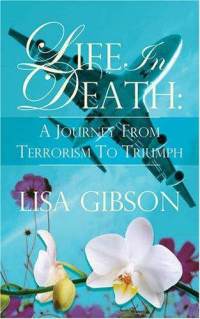 Prosperity Alliance. A charismatic Christian attorney, her simple message of forgiveness offered to the Libyan terrorists who killed her brother (murdered in the PanAm Flight 103 that explode over Lockerbie, Scotland in 1988)—earnestly told in Life in Death: A Journey From Terrorism to Triumph (Xulon; $15.99)—moved us all. That she now does workshops on forgiveness all over the world, including in Libya (and had a rare race-to-face encounter with Muammar Gaddafi before his execution) is clearly an indication that God is blessing her, opening doors to preach the gospel, to talk of grace, and to call enemies to reconciliation.
Prosperity Alliance. A charismatic Christian attorney, her simple message of forgiveness offered to the Libyan terrorists who killed her brother (murdered in the PanAm Flight 103 that explode over Lockerbie, Scotland in 1988)—earnestly told in Life in Death: A Journey From Terrorism to Triumph (Xulon; $15.99)—moved us all. That she now does workshops on forgiveness all over the world, including in Libya (and had a rare race-to-face encounter with Muammar Gaddafi before his execution) is clearly an indication that God is blessing her, opening doors to preach the gospel, to talk of grace, and to call enemies to reconciliation.
It was a delight, and felt like an honor, to be around the wonderfully esteemed Mennonite gentleman missionary, David Shank, who has worked his whole life on these missiological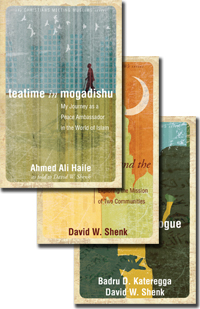 issues. He has had his book, co-authored with Badru Kateregga, A Muslim and Christian in Dialogue (Herald Press; $14.99) translated into Arabic, and he has been invited to share his it with radical Muslim leaders (who reported being astonished that a Christian could be so gracious, and that Jesus spoke so much about peace and love of enemy.) His Journeys of the Muslim Nation and the Christian Church: Exploring the Missions of Two Communities (Herald Press; $14.99) is nearly as classic and the riveting Teatime in Mogadishu: My Journey as a Peace Ambassador in the World of Islam by (Somalian convert to Christ) Ahmed Ali Haile as told to David Shenk (Herald Press: $14.99) is fabulously inspiring. I hope you consider these, perhaps for a book group or adult ed class as they are really quite interesting.
issues. He has had his book, co-authored with Badru Kateregga, A Muslim and Christian in Dialogue (Herald Press; $14.99) translated into Arabic, and he has been invited to share his it with radical Muslim leaders (who reported being astonished that a Christian could be so gracious, and that Jesus spoke so much about peace and love of enemy.) His Journeys of the Muslim Nation and the Christian Church: Exploring the Missions of Two Communities (Herald Press; $14.99) is nearly as classic and the riveting Teatime in Mogadishu: My Journey as a Peace Ambassador in the World of Islam by (Somalian convert to Christ) Ahmed Ali Haile as told to David Shenk (Herald Press: $14.99) is fabulously inspiring. I hope you consider these, perhaps for a book group or adult ed class as they are really quite interesting.
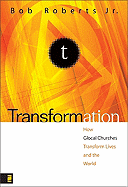 And what a joy it was to recommend titles to Texas mega-church pastor and author Bob Roberts, whose books Transformation: How Glocal Churches Transform Lives and the World (Zondervan; $19.99) and Glocalization: How Followers of Jesus Engage a Flat World (Zondervan; $18.99) help ordinary churches reach out in more global ways. We laughed about the word “glocal” which he borrowed from Len Sweet, who maybe swiped from VisaCard. Check out his Domains video to see how Rev. Roberts equips the folks in his Northway church to use their
And what a joy it was to recommend titles to Texas mega-church pastor and author Bob Roberts, whose books Transformation: How Glocal Churches Transform Lives and the World (Zondervan; $19.99) and Glocalization: How Followers of Jesus Engage a Flat World (Zondervan; $18.99) help ordinary churches reach out in more global ways. We laughed about the word “glocal” which he borrowed from Len Sweet, who maybe swiped from VisaCard. Check out his Domains video to see how Rev. Roberts equips the folks in his Northway church to use their
ordinary job skills and workplaces–domains, he calls them—to
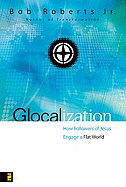 serve the world. His preaching and teaching this missional vision has paid off: the government of Viet Nam asked them to help create a curriculum to teach special education teachers; he is sending short term workers from his church to Afghanistan, too, doing simply extraordinary work. If you are inspired by that video idea, order his useful book Real-Time Connections: Linking Your Job with God’s Global Work (Zondervan; $16.99) which is pretty darn great. His flock are the real deal, doing stunning stuff in hard places.
serve the world. His preaching and teaching this missional vision has paid off: the government of Viet Nam asked them to help create a curriculum to teach special education teachers; he is sending short term workers from his church to Afghanistan, too, doing simply extraordinary work. If you are inspired by that video idea, order his useful book Real-Time Connections: Linking Your Job with God’s Global Work (Zondervan; $16.99) which is pretty darn great. His flock are the real deal, doing stunning stuff in hard places.
And how we enjoyed the conservative Republican former Governor of SC, David Beesley, telling stories of talking about Jesus and the Koran with radical Muslims in Yemen. His administrative assistant is an acquaintance of ours and even while we were talking books at the book display, his cell phone went off—it appeared that their flight to Yemen was on time: yes, despite the ugly and threatening uprisings there in the previous 24 hours, they were heading into the conflict zone. Beesley is a real character, happy to admit he wasn’t very internationally astute, but that he knew the One who was: Jesus!
And to think that the always-grumpy journalist Mark Tooley of the Institute of Religion and Democracy reported at Frontpage online that this was a lightweight gathering of lefty pacifists, complete with a snarky graphic shouting “surrender” as if the EfP was advocating a position (against whom?) of appeasement. I thought of his disapproval of this event when one speaker said that it is often the case that those who are most vivid in their anger and alarm against the threat of radical Islam have never met any Muslims, let alone have they ever been imprisoned or stoned by hostile Muslims, as he had been. No, these EfP speakers did not romantically idealize “the other” or gloss over the violence of those who do grave injustices to others, enemy nations or violent terrorists. Yes, there were concerns about religious freedom — of course, we had Paul Marshall’s must-read, sobering book about the growth of blasphemy laws and religious repression in Islamic countries called Silenced: How Apostasy and Blasphemy Codes are Choking Freedom Worldwide (Oxford University Press; $35.00.) Many of the speakers at Evangelicals for Peace have indeed seen the harsh ugliness of human sin up close; there was little naïveté or political idealism (although there was confidence in the goodness of God and the hope of the gospel.) There was, again, in the exciting conversations about building peace, a weight, an urgency, and a sense of realism and of the potential costs of our proposals.
Jim Wallis told us of the day he was with a church in Ohio, decades ago, doing a talk about peace-making. During his visit, he got word that Ocotol, a town in Nicaragua, had just been attacked and children massacred by U.S.-backed contra rebels. As Jim reported the grim news to this congregation, they started to sob: some of them had recently been to Ocotol as part of the Witness for Peace efforts (where US Christians nonviolently went into war zones to serve as human buffers against the bombings) and so they had new friends, brothers and sisters in Christ, even, in that town. Did they survive, they wondered? How was Manuel, or Roberta, or her little child, Sofia? (My own sister-in-law was with a Witness for Peace group when that massacre had happened, and they took bloody clothes of children to the U.S. Embassy, who mocked them. So the story was particularly poignant to Beth and me.)
Wallis’ point is a good one: as we do these kinds of ministries of reconciliation, as we travel in short-term mission trips and learn the names of others, even others that our government calls enemies, it changes everything. Our view of international diplomacy, foreign policy, and warfare, is no longer abstract. As we try to discern the truth of things, the best we can, we consider not just the briefings offered by the State Department or White House, but from friends on the ground, brothers and sisters who can give us feedback that is less colored by U.S. foreign policy goals. Sometimes, our own friends are under assault and such a “human face” tempers us in profound, important ways.
Of course, this is stil
l tricky, and there are nonetheless differences of opinions about the ethics of violence, the role of military action and war. And, among those who favor some military involvement, there are obvious disagreements as to when that is most appropriate or acceptable. I have said before that our bookstore carries many books from a variety of viewpoints on these issues, even though few people seem to care to study much about such things. It was an honor to display some of them at the EfP gathering, and we were glad to meet folks seriously rooted in the Biblical material about peacemaking and reconciliation. We were glad to learn more from those who have taken the gospel message, including its political implications, into hard places. Scholars, activists, organizers, prayer-warriors, missionaries—what a gathering!
Two other speakers (besides the favorites I’ve mentioned) left their mark on the gathering. Eric Patterson is an astute just war theorist, one who holds to the tradition’s legitimizing of state violence (often called “force” since it isn’t considered to be inappropriate or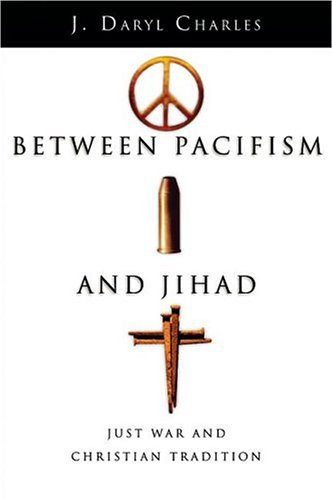 antinomian in this school of thought, so it to be considered differently than raw violence.) He reminded us quickly of the jus ad bello and the jus in bello criteria, and recommended the well-informed, no-nonsense book, War, Peace and Christianity: Questions and Answers From a Just-War Perspective by J. Daryl Charles & Timothy Demy (Crossway; $25.00) which we carry. I somewhat prefer, by the way, and featured, Charles’ earlier book, Between Pacifism and Jihad: Just War and Christian Tradition (IVP; $21.00) as it seems to me to be written with less caricature of the pacifist view, a bit of a downfall of the feisty Crossway one. We stock most of the standard just war theory texts, too, Walzer, Elshtain, Weigel, James Turner Johnston and the like.
antinomian in this school of thought, so it to be considered differently than raw violence.) He reminded us quickly of the jus ad bello and the jus in bello criteria, and recommended the well-informed, no-nonsense book, War, Peace and Christianity: Questions and Answers From a Just-War Perspective by J. Daryl Charles & Timothy Demy (Crossway; $25.00) which we carry. I somewhat prefer, by the way, and featured, Charles’ earlier book, Between Pacifism and Jihad: Just War and Christian Tradition (IVP; $21.00) as it seems to me to be written with less caricature of the pacifist view, a bit of a downfall of the feisty Crossway one. We stock most of the standard just war theory texts, too, Walzer, Elshtain, Weigel, James Turner Johnston and the like.
Patterson’s own academic books are quite astute, themselves, especially as he makes a major contribution regarding how the jwt relates to ending wars and their aftermath; see, for instance, his important edited collection Ethics Beyond War’s End (Georgetown University Press; $29.95) and the highly regarded, recent Ending Wars Well: Order, Justice, and Conciliation in Contemporary Post Conflict (Yale University Press; $55.00.) It was good of the conference to have this heavy call to attend to the serious questions raised by the just war theory. And it was good of Dr. Patterson to speak to this tradition within this gathering.
Glen Stassen also was very important as he implied that one need not be a hawkish just war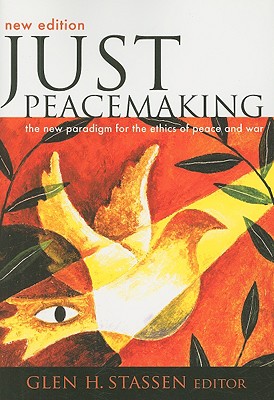 theorist that justifies nearly every war or a pure pacifist that refuses to engage the details of realpolitik. Rather than endlessly debate the matter about violence, why not work together to find ways to actually reduce the likelihood of armed violence? His edited volume–including 23 scholars, each offering a chapter on one of the just peacemaking principles—called Just Peacemaking: The new Paradigm for the Ethics of Peace and War (Pilgrim Press; $18.00) is a vital resource showing, from serious research, just what sort of things might happen to prevent warfare, to minimize injustices, to develop diplomatic pressures for human rights, all of which can help us find alternatives to war. Some may derisively dismiss this as “crypto-pacifism” but it is a good start, I think. Just war theorists and pacifists alike should agree that we should work to find solutions to conflict so that war would be, at least, usually, a last-ditch resort.
theorist that justifies nearly every war or a pure pacifist that refuses to engage the details of realpolitik. Rather than endlessly debate the matter about violence, why not work together to find ways to actually reduce the likelihood of armed violence? His edited volume–including 23 scholars, each offering a chapter on one of the just peacemaking principles—called Just Peacemaking: The new Paradigm for the Ethics of Peace and War (Pilgrim Press; $18.00) is a vital resource showing, from serious research, just what sort of things might happen to prevent warfare, to minimize injustices, to develop diplomatic pressures for human rights, all of which can help us find alternatives to war. Some may derisively dismiss this as “crypto-pacifism” but it is a good start, I think. Just war theorists and pacifists alike should agree that we should work to find solutions to conflict so that war would be, at least, usually, a last-ditch resort.
Stassen, by the way, has a new book coming out soon, and we are taking PRE-ORDERS for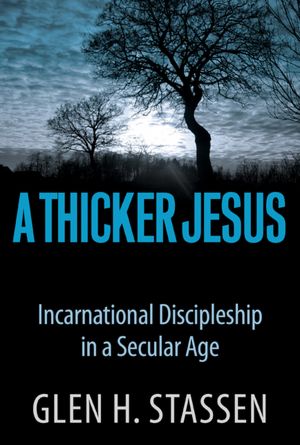 it at almost half price. The publisher is giving us a bit of a deal, and we’re happy to pass the savings on to you. For a just a few weeks, we are offering A Thicker Jesus: Incarnational Discipleship for a Secular Age (Westminster/John Knox; $25.00) at a special pre-publication price. If you order it now, it is $10.00 off — just $15.00.) I’ve read some of the early version and it is serious, intense even, and draws on Bonhoeffer a bit.
it at almost half price. The publisher is giving us a bit of a deal, and we’re happy to pass the savings on to you. For a just a few weeks, we are offering A Thicker Jesus: Incarnational Discipleship for a Secular Age (Westminster/John Knox; $25.00) at a special pre-publication price. If you order it now, it is $10.00 off — just $15.00.) I’ve read some of the early version and it is serious, intense even, and draws on Bonhoeffer a bit.
Here are a handful of other good books that illustrate this exact point, books that show that Christian peacemaking is viable, that the science of faith-based diplomacy is advancing, and that “overcoming evil with good” is not only a Bible mandate, but a sensible approach that, sometimes, it seems, actually works. I think it is sad that these kinds of books—-proving that lives can be saved and faithful efforts can work—are so little known among us. Spread the word, friends. If most Christian bookstores don’t carry this kind of stuff, we have to try harder to get the news out: Christian peacemaking is alive and well. God’s people are leading the way, in quiet and experimental ways, to help us deal with the human propensity towards violence.
Thanks to friends old and new at Evangelicals for Peace. Thanks to co-sponsors Peace Catalyst, Evangelicals for Social Action, Sojourners, The New Evangelical Partnership for the Common Good, and the WEA. May it be that through God’s merciful grace, we may be called—as promised in Matthew 5:9–the very children of God.
War: A Primer for Christians Joseph Allen (Southern Methodist University Press) $5.95 When asked for something basic and simple on this complex topic I often recommend this first of all. The “crusades” chapter condemns holy war as unacceptable. Then the pacifist chapter seems to embrace nonviolence as the best Biblical option. But wait, the just war theory is not only clear, but rather compelling. Hmm. Yep, he is fair and clear and allows readers to think it through for yourselves. Not nearly enough, of course, but for an inexpensive, short primer it is nearly perfect.
Peacemaking: Resolving Conflict, Restoring and Building Harmony in Relationships: A Study Guide Dr. Rick Love (William Carey Library) $19.99 This is an 81/2 x 11 workbook style book, a fabulous Bible study guide and a thorough resource by a seasoned missionary and church planter. Endorsements on the back are from David Powlison (a leader in the Biblical Counseling movement, formerly of Westminster Theological Seminary) and Dr. Greg Livingstone, founder of Frontiers and one of the great missionary figures of the last 40 years. Love has searched the Scriptures well, and offers here 21 units (sessions) on all manner of instruction on how to be agents of God’s reconciliation, resolving conflict and building harmony in relationships. A must for every church who wants to equip people to know how to act like Christians even in interpersonal conflict. Very positive, a wonderful gift for the church — not so much on international affairs or military concerns, but still a wonderful intro to the grand themes of shalom and reconciliation.
Just War, Lasting Peace: What Christian Traditions Can Teach Us edited by Dolores R. Leckey (Orbis) $16.00 There is much debate these days in some circles about the just war theory, and many of the most rigorous scholars are, well, exceptionally scholarly and quite detailed, seeming to some to be a bit too arcane to be inspiring for ordinary folks. And, of courses, there is the common accusation that too often the theory is used to justify sadly gross things, civilian causalities and such. (And, also, some make rude pot shots at all just war theories, as if they are merely glossing over all injustices and the horrors of war, a view that I find ill informed at best.) Here, Catholic thinkers with a clear hope to inform lay people (there are good discussion questions to ponder) try to garner the jwt for peaceable purposes. As R. Scott Appleby (of the Kroc Institute for International Peace Studies at Notre Dame) writes, this book “brings together many of the leading authorities on the ethics of the use of force, makes their ideas accessible to a wide audience, shows them thinking on their feet in conversation with others, and provides a kind of “how to” manual for those who want to go deeper… this smart survey is a reliable and exacting starting point for an intellectual and moral journey that may inspire a lifetime vocation.”
Just War as Christian Discipleship: Recentering the Tradition in the Church rather than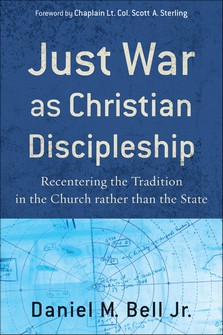 the State Daniel Bell, Jr. (Brazos) $21.99 Well, this is a book unlike most just war resources. As Chaplain Lt. Col. Scott Sterling writes in the forward “Bell has written a book that I wish I had during my deployments…contributes to the Christian soldier’s desire to embody the principles as a lifestyle…” Bell studied at Duke, teaches at a Lutheran seminary, and is ordained in the United Methodist church. I know of know book that does what this does, and we highly recommend it for anyone studying this topic. As Hauerwas says, Bell has “breathed new life into these debates…we are in his debt.”
the State Daniel Bell, Jr. (Brazos) $21.99 Well, this is a book unlike most just war resources. As Chaplain Lt. Col. Scott Sterling writes in the forward “Bell has written a book that I wish I had during my deployments…contributes to the Christian soldier’s desire to embody the principles as a lifestyle…” Bell studied at Duke, teaches at a Lutheran seminary, and is ordained in the United Methodist church. I know of know book that does what this does, and we highly recommend it for anyone studying this topic. As Hauerwas says, Bell has “breathed new life into these debates…we are in his debt.”
Reborn on the Fourth of July: The Challenge of Faith, Patriotism and Conscience Logan Mehl-Laituri (IVP) $15.00 My brief chat with Logan was one of the great pleasures of the conference for me, although pleasure might be overstating it. You may recall my rave review of this important story in my summer list of favorite memoirs. A serious soldier in Iraq as a forward observer/fire support specialist he had a change of conscience and applied for conscientious objector status. After his discharge he was involved in peace-building efforts in Palestine (and involved with Shane Claiborne and Jonathan Wilson Hartgrove in their “Gospel of Rutba” episodes.) His testimony of embracing a nonviolent sort of discipleship, and a devout patriotism that calls into question hurtful nationalism, is riveting. Regardless of your views on these volatile subjects, I highly recommend this book. As he says, finally, it is not a book about war, it is a book about God. Thank you, Logan, for the hard work it took to share this hard, hard stuff.
Alone with a Jihadist: A Biblical Response to Holy War Aaron D. Taylor (Foghorn Publishing) $18.95 Probably not too many people recognized Aaron Taylor when he was thanked from the main stage at Evangelicals for Peace. Rick Love gave the shout out and noted that it was Aaron’s vision to do this, and his compelling plea that so touched Rick’s heart. This is a stunning story, plainly told, and I cannot recount it all here. The short version is that Taylor was a fundamentalist missionary, trying to convert Muslims. We evangelicals, naturally, appreciate such missionary zeal and applaud those who risk much for the sake of the gospel.
Yes, but what happens if our approach is essentially hostile? (Brian McLaren explores this in his own fascinating way in the brand new Why Did Jesus, Moses, the Buddha and Mohammad Cross the Road? Christian Identity in a Multi-Faith World published by Jericho; $24.95) Well, Aaron, with the surprising help from a secular filmmaker, and seven solid hours in a room face to face with a Jihadist, came to realize that he was perhaps missing a profound love for his Islamic targets. He had to reevaluate his views of the Kingdom of God, the politics of the Middle East, the role of nationalism, and, supremely, the call of Christ to love even our enemies. What an honest, powerful story, by one of the behind the scenes organizers of Evangelicals for Peace. Thanks be to God.
Just Policing, Not War: An Alternative Response to World Violence Gerald Schlabach,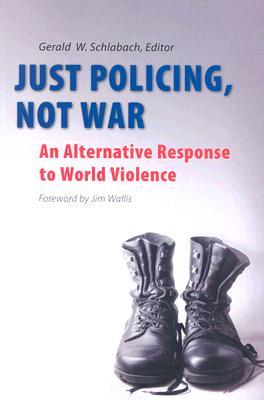 editor (Michael Glazier) $27.95 Schlabach is a Mennonite pacifist who has long been engaged not only in conflict resolution studies, but it fabulous conversations with just war theorist of the Roman Catholic tradition. Here, he offers the mutually agreed upon legitimacy of policing as a paradigm for thinking about some common ground, a different model than the conventional military one. There are serious ideas floated here, and solid debate. There are ten good chapters, from Anabaptists and Jesuits, Presbyterians and Catholics, both more conservative and more liberal. Nicely dedicated to both John Paul II and John Howard Yoder.
editor (Michael Glazier) $27.95 Schlabach is a Mennonite pacifist who has long been engaged not only in conflict resolution studies, but it fabulous conversations with just war theorist of the Roman Catholic tradition. Here, he offers the mutually agreed upon legitimacy of policing as a paradigm for thinking about some common ground, a different model than the conventional military one. There are serious ideas floated here, and solid debate. There are ten good chapters, from Anabaptists and Jesuits, Presbyterians and Catholics, both more conservative and more liberal. Nicely dedicated to both John Paul II and John Howard Yoder.
Transforming Violence: Linking Local and Global Peacemaking Edited by Robert Herr & Judy Zimmerman Herr (Herald Press) $12.99 This is another excellent, mostly (but not exclusively) Anabaptist, collection, pulled together expertly by old friends of ours from Pittsburgh. Noted writers from Africa, Asia, Europe and the Americas weigh in on both the theories of conflict resolution and on specific case studies. The late Walter Wink has a chapter here as does the German Dorothee Soelle, both ecumenical, mainline Protestants. Roman Catholic (although now orthodox) Jim Forest pens a good piece as do others who are involved in the international Fellowship of Reconciliation. What a fine ecumenical conversation, both on the questions of violence and how to influence the world’s hurtful systems in ways that are faithful to the nonviolent ways of Jesus. Fascinating!
At Peace and Unafraid: Public Order, Security, and the Wisdom of the Cross Edited by Duane Friesen & Gerald Schlabach (Herald Press) $19.99 This includes robust (Mennonite) peace theology, dozens of case studies of conflict resolution, and ways to consider the foolishness of the gospel and the need for justice, order, freedom and security. 21 chapters, 455 pages. Excellent.
Getting in the Way: Stories from Christian Peacemaker Teams edited by Tricia Gates Brown (Herald Press) $18.99 There are other books on this, but this is the one to start with — stunning, honest accounts of those who boldly, in faith and humility, entered war zones to offer a Christian presence with victims, and to with their bodies say no to war. These are thrilling, courageous and informative telling of ordinary women and men who do some
pretty amazing ministry. This is vivid and harrowing and unlike nearly anything you’ve read before.
The Early Church on Killing: A Comprehensive Sourcebook on War, Abortion, and Capitol Punishment edited by Ronald J. Sider (Baker Academic) $27.99 Harold Attridge of Yale Divinity School notes that it is “racing to be reminded of this cloud of witnesses from the early church of the value that early Christians places on human life.” This is a definitive study, a sourcebook including bits from Christian writers before Constantine (The Didache, First and Second Clement, Tatian, Irenaeus, Tertullian, Cyprian, Lactantius and the like.) It includes relevant passages from the Church Orders and Synods, and describes the evidences of Christian soldiers before Constantine (and their martyrdom.) It is historical research of excellent quality with, I’d think, considerable implications. The acknowledgements are remarkable as he drew on help from Patristic scholars and translators who studied inscriptions. It was neat at EfP running into Rob Arner whose Consistently Pro-Life: The Ethics of Bloodshed in Ancient Christianity (Pickwick) is cited in Sider’s valuable sourcebook. Ron’s book, by the way, Christ and Violence (Wipf & Stock; $15.00) was the first book I ever reviewed professionally — back in the ’70s when my little review appeared in Sojourners. It is still one of my favorite books, a compelling call to Biblical nonviolence, based, largely on Romans 5. While we were yet his enemies, Christ died for us. I am forever grateful for Ron’s solid exegesis and Christ-centered call to radical discipleship. And I’m glad it is still in print. Not sure how long it will remain available, so you should order one while you can. Very, very clear and compelling.
BookNotes
DISCOUNT
any book mentioned
2O% off
order here
takes you to the secure Hearts & Minds order form page
just tell us what you want
inquire here
if you have questions or need more information
just ask us what you want to know
Hearts & Minds 234 East Main Street Dallastown, PA 17313
